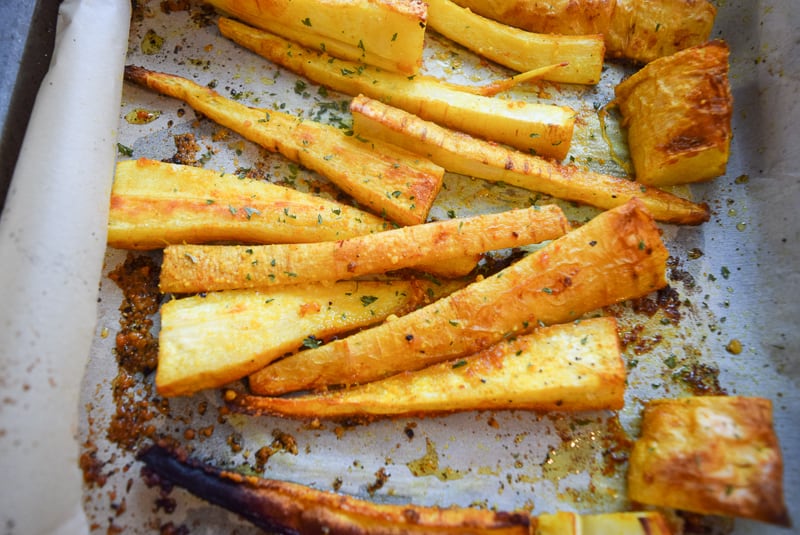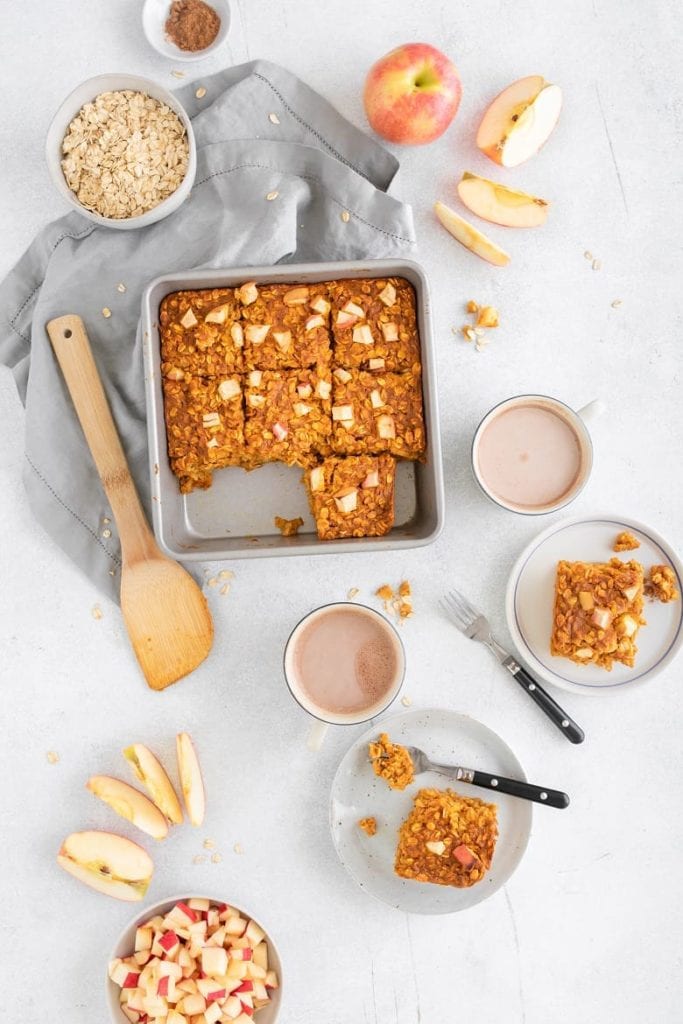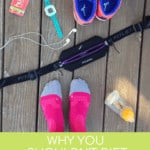Why You Shouldn’t Diet While Training
- March 12, 2018
- Last Updated: January 24, 2025
- 35 Comments
- Running
I hope you all had a wonderful weekend! We finished up some projects and almost finished the last of the shopping for baby things. Our Sunday started with some cinnamon buns (after sleeping in), which was a wonderful way to adjust to the time change. While I look forward to some extra daylight, I’m just not a fan of time changes. Are you?
It’s weird for me on weekends to not have a long run to do, or anything training related. Don’t get me wrong – it’s been nice to enjoy slow mornings, and head to the gym whenever I crave some movement. But, it’s also weird to not be focusing on pre- and post-long run fueling.
We live in a pretty active neighborhood and community. It’s very common to see early morning runners and cyclists out and about. Especially as we head into the spring marathon season. And while parts of me have enjoyed time off from long distance running, there’s a greater part of me that misses training and all it has to offer.
Today’s post is actually in response to a reader email I received. The reader asked how to balance nutrition and training when she knows deep down she still desires weight loss. While she is practicing some of the principles of intuitive eating, she’s struggling about managing joyful movement.
So today, we’re talking about throwing the diet mentality away during training.

Balancing Training and Nutrition
Those training for Boston, or even other races, are doing their peak long runs right now. In fact, I have a few clients in the midst of training. What I see most often with training is 90% focus on the training plan, and only a 10% focus on nutrition. In reality, the focus on nutrition needs to be wayyy higher, especially if someone is looking for optimal performance and recovery.
And, I get it. I’ve followed training plans and run many races. You want/need a good training plan to feel confident and excited. But, you should also have a powerful nutrition plan. Since my office is in a gym, I see a lot of athletes. And I do a lot of talks just spreading awareness about the importance of changing nutrition as you increase your exercise.
Even if you don’t need a dietitian’s services for a long time period, I think it’s extremely useful to work with someone in the beginning as you lay out your training plan and test the waters. You want to make sure you’re getting the right balance of macronutrients, as well as sufficient vitamins and minerals as well.

To state the obvious, training is a huge stressor on the body. Heck, even if you’re not “training,” but you are just an intense exerciser. Spending 3 hours at the gym, or doing multiple workouts a day isn’t necessarily “healthy,” and can be borderline dangerous if you don’t have your nutrition plan in tune.
Intense exercise releases excessive cortisol, our stress hormone. You’re logging longer hours on your feet, and often times, more intense training sessions. You’re using more oxygen, requiring more calories, and burning through more micronutrients (like iron, magnesium, zinc, etc). Your body may need more time to recover, which it may or may not get, depending on your training schedule.
I have some people approach me saying they only want to run a race or engage in training to lose weight. And that tells me that they don’t quite understand their body’s needs. When we start using exercise as the end all be all for weight loss, rather than for enjoyment and well-being, we enter into dangerous territory. When we pride ourselves on being “motivated” or “healthy,” yet those motivated and healthy behaviors revolve around doing more and eating less, we are making things much worse off for ourselves.
Training and Dieting Don’t Mix
Bottom line —> Training for something is not the time to diet.
While I don’t recommend dieting in general, doing so while training is absolutely not recommended. Your body is already in a vulnerable state. Remember how I said that exercise is stressful? Dieting is stressful too. Also, remember that dieting plays a physical and psychological role on us.
Dieting causes harm to the individual, distorts body image and self-esteem, and is a major contributor to eating disorders. Furthermore, nearly 95% of diets fail. Would you follow a training plan if 95% of people failed using that same plan? Probably not.
You’re already expending more calories than you probably realize when training, except dieting will slow your metabolism. In essence, despite training more, eating less will slow your metabolism further.
Food is not something to restrict or cut out, but instead, something that normally needs to be increased and optimized. When I’m working with my athletes, we often talk in terms of eating attempts each day – we usually have a goal for the number of times we want to eat and fuel throughout the day, depending on when and what the training schedule looks like.
We don’t talk in terms of calories or numbers – and there’s a lot of flexibility based on foods the athlete likes and desires, as well as what they actually need.

What Else Food Offers
To state it simply, food is more than just calories – it’s how you can recover. It’s going to help strengthen immunity and help prevent muscle injuries. Sufficient food and nutrients are how you replenish stores so you can continue your training. The antioxidants that help stave off free radicals are found in food.
The necessary carbohydrates that replenish your liver and muscle glycogen stores are found in foods. Amino acids needed to build proteins and muscle mass are found in food. Food also has many other synergistic properties that supplements can’t offer.
Limiting foods will prohibit your body from getting all it needs. Trying to stay under a certain amount of calories could be ruining your sense of intuitive eating, but also, depriving your body of fuel it needs to perform and recover. Those in training often need higher amounts of macro and micronutrients.
Strenuous exercise increases sweat and urinary magnesium losses, meaning the need for it can increase by as much as 10 to 20 percent as physical activity levels increase.

Dieting while training could also put you at risk of electrolyte disturbances, increased risk of stress fractures and injury, or prolonged soreness and fatigue.
Are you experiencing signs of not eating enough for your training? Some of those symptoms may look like irregular or lost periods, trouble sleeping or trouble recovering from workouts. Furthermore, constant fatigue, feeling cold and even feeling more susceptible to sickness more often can also indicate overtraining.
These are signs that your nutrition and training aren’t matching up.
Other Running Posts You May Enjoy
How Nutrition Helps with Running Performance and Recovery
7 Reasons to Run that have nothing to do with weight
What time away from Running Taught Me – Seems that it was about this time last year I took a little running break too.
If you guys have any specific questions about nutrition and training, or want me to do a specific post, let me know!
Are you training for anything currently?
Fan of the time change or not?
Support Bucket List Tummy









Like This Content?
Support Bucket List TummyCompletely agree. It’s about WHAT you eat, not limiting your nutrition.
What a great post and it came at the right time for me. I have always secretly hoped that running would help me lose weight. After a year of running, it hasn’t done that. I am now training for my first Half Marathon on 13th May. I have been sensible in that I have decided not to diet or restrict calories. Just to focus on my training and healthy eating. However, it is a bit disheartening when I see that I am putting on weight…is that normal with training or do you think I may be “over-rewarding” myself with treats for each run?
It’s incredible and awesome and amazing how our bodies NEED that fuel to repair and recover, and when you diet during training it makes it much harder. <3 LOVE that you concluded with dieting and training just can't mix.
I love this post and will be sharing….
Great points! Food is fuel. I am often teased at work because I’m always eating. LOL. I need my fuel! Unfortunately, calorie restriction is so ingrained in the mindset of many women. How exciting that baby is due soon! Thanks for linking.
Wonderful post, I agree! It was a hard lesson for me to learn, but once I started fueling myself more I actually ran WAY better. Thanks for getting this message out there
So glad to hear that, Becca!
Great post, Sarah. I totally agree! It’s so important to focus on enough quality nutrition while training and it is definitely not the time to cut calories. I also find that most women struggle to lose weight anyway while training for distance- it doesn’t necessarily make it easier, in many cases it makes it harder because the body is so worn out and stressed.
I completely agree with you – there’s alot of stress on the body during marathon training that weight loss/calorie restriction is another stressor.
Such a good reminder! I actually trained for a half marathon before my wedding and that was a BIG mistake. I actually ended up not doing the half because I was so worn down and was afraid my body would break down and I’d be limping down the aisle!
That’s a great point – people think they train anytime but I definitely wouldn’t do it when you have other priorities, like wedding planning!
Such a good reminder! I actually trained for a half marathon before my wedding and that was a BIG mistake. I actually ended up not doing the half because I was so worn down and was afraid my body would break down and I’d be limping down the aisle!
I’m in the peak weeks of marathon training and I don’t know why anyone would even consider underfueling. That’s one of the things I love about running is the change in focus on what my body looks like to what it can do. Plus I’m hungry all the time. 🙂
Constant hunger is so real! What marathon are you training for?
Great info! Thanks for sharing. We actually don’t do the time change here, but it seems like it would be a weird adjustment.
It’s a tougher adjustment than it seems!
Oie. Too many risk factors. I love how you speak with your clients about the number of “food attempts” in a day and how often they eat, rather than the calories and numbers. If I were training I’d come to you in a heartbeat!
Aw thanks Cora 🙂
I love all of your posts on eating and training. This one is no exception! Unfortunately I think diet culture is so ingrained in people now that it’s hard to realize that increasing your training or activity level means you’ll eat more food. Since I started training more and paying attention to what I’m eating, I’ve lost weight/gotten more toned even though I’m taking in more calories. You need to fuel your body so you can continue training!
It can be difficult for people to be conscious about it, because like you said, there are messages all around saying “eat less,” “be thin!” But, those don’t correlate with athletic performance.
You are so right about this! I think many people getting into a dieting mindset and then start running, which often turns into training. If they don’t change that dieting mentality it could be really problematic!
I’ve seen some of the horror stories – runners can become overly obsessive so we definitely work on a nutrition foundation.
Wow, spot on info! I still momentarily freak out and get annoyed if I see a few extra pounds on the scale. My former self (from my college days) would instantly think I needed to eat less food…and all that really accomplished was screwing up my metabolism.
Runners are big numbers people, which is why it can sometimes be difficult to take the focus off calories and weight. But I find that it helps so much.
I completely agree with you although it’s easy to get swept up into thinking you have it all figured out!
Sometimes we learn the hard way when we’re constantly tired or not recovering/performing.
I am currently training for a marathon, but honestly I don’t find myself eating any differently. I just do not feel guilty when I over indulge a bit after a long run.
These are great points. I definitely eat well when I’m training. Luckily my body usually craves healthy foods.
Love that your listening to your body, that’s the best we can do.
Excellent post! I agree that training and dieting don’t mix. I went to a brief seminar recently where they talked about the micronutrients needed for recover and I found that to be very interesting.
Those are what are often overlooked too!
Preach! I tell people this all the time and I get shot down.It’s all about making smart food choices. Not about dieting. Really great post.
Thanks Wendy!